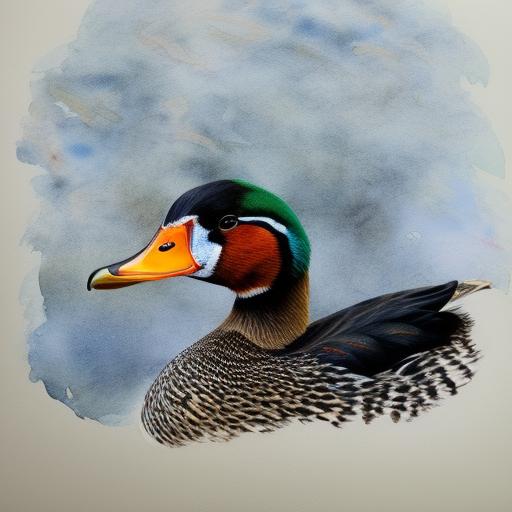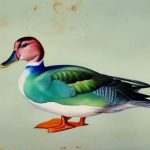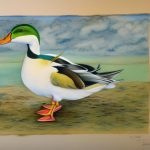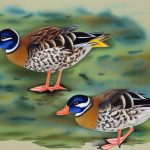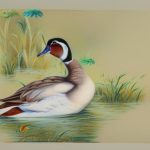Black duck breeds are a popular choice for many duck enthusiasts in the UK. These breeds are known for their striking black plumage and unique characteristics. They are often kept for their ornamental value, as well as for their eggs and meat. Black duck breeds come in various sizes and have different temperaments, making them suitable for different purposes. In this article, we will explore the history and origins of black duck breeds, their physical appearance and characteristics, popular breeds in the UK, care and maintenance, breeding and rearing, as well as the conservation and protection efforts for these beautiful birds.
Key Takeaways
- Black duck breeds are popular in the UK for their unique appearance and characteristics.
- The history and origins of black duck breeds can be traced back to various regions around the world.
- Black duck breeds are known for their distinctive physical appearance, including their dark plumage and unique markings.
- Some popular black duck breeds in the UK include the Cayuga, East Indian, and Swedish Black.
- Proper care and maintenance, as well as breeding and rearing practices, are essential for the conservation and protection of black duck breeds in the UK.
History and Origins of Black Duck Breeds
The history of black duck breeds can be traced back to ancient times when they were first domesticated for their meat, eggs, and feathers. The exact origins of black duck breeds are not well-documented, but it is believed that they were bred from wild ducks found in various parts of the world. Over time, selective breeding has led to the development of different black duck breeds with distinct characteristics and traits. In the UK, black duck breeds have been popular for centuries, with breeders and enthusiasts working to improve the breeds through careful selection and breeding practices. Today, black duck breeds are valued for their beauty, versatility, and adaptability to different environments.
Characteristics and Physical Appearance of Black Duck Breeds
Black duck breeds are known for their striking black plumage, which can vary in shade from glossy black to a more matte finish. They often have a sleek and elegant appearance, with a distinctive sheen to their feathers. These breeds come in various sizes, with some being smaller and more compact, while others are larger and more robust. Black duck breeds also have different physical characteristics, such as bill shape and leg color, which can vary depending on the breed. In terms of temperament, black duck breeds are known to be hardy and adaptable, making them suitable for both backyard hobbyists and commercial farmers. They are also known for their foraging abilities and are often kept for pest control in gardens and agricultural settings.
Popular Black Duck Breeds in the UK
In the UK, there are several popular black duck breeds that are favored by enthusiasts and breeders. The Cayuga duck is one of the most well-known black duck breeds, prized for its iridescent greenish-black plumage and friendly disposition. The East Indie duck is another popular breed, known for its small size and distinctive beetle-green sheen to its feathers. The Orpington duck is a larger breed with a solid black plumage and a gentle nature, making it a popular choice for both exhibition and utility purposes. Other popular black duck breeds in the UK include the Swedish Black duck, the Black Runner duck, and the Welsh Harlequin duck. Each of these breeds has its own unique characteristics and is valued for different reasons by duck enthusiasts.
Care and Maintenance of Black Duck Breeds
Caring for black duck breeds requires attention to their specific needs in terms of housing, feeding, and general maintenance. These ducks thrive in a free-range environment with access to water for swimming and foraging. They also require shelter from predators and the elements, as well as protection from diseases and parasites. Providing a balanced diet that includes a mix of commercial feed, greens, and insects is essential for maintaining the health and well-being of black duck breeds. Regular health checks, grooming, and cleaning of their living quarters are also important aspects of their care. Additionally, providing enrichment activities such as access to ponds or streams, as well as social interaction with other ducks, can contribute to their overall welfare.
Breeding and Rearing Black Duck Breeds

Breeding black duck breeds requires careful consideration of genetics, health, and welfare to produce healthy offspring with desirable traits. Selecting breeding stock with good conformation, temperament, and productivity is essential for maintaining the quality of the breed. Breeding programs should aim to avoid inbreeding and genetic defects by introducing new bloodlines when necessary. Rearing black ducklings involves providing a warm and safe environment for hatching and brooding, as well as ensuring proper nutrition and care during their early development. It is important to monitor the growth and development of ducklings closely to identify any health issues or developmental problems early on. Proper socialization and exposure to different environments can also help young ducks adapt to their surroundings and develop into well-adjusted adults.
Conservation and Protection of Black Duck Breeds in the UK
Conservation efforts for black duck breeds in the UK are important for preserving genetic diversity and maintaining the viability of these unique breeds. The Rare Breeds Survival Trust (RBST) plays a key role in promoting the conservation of rare and native breeds, including black ducks. Through education, advocacy, and support for breeders, the RBST aims to raise awareness about the value of these breeds and encourage responsible breeding practices. Additionally, breed clubs and associations provide a platform for enthusiasts to exchange knowledge, share resources, and collaborate on conservation initiatives. Protecting the habitats of wild ducks and promoting sustainable farming practices can also contribute to the conservation of black duck breeds by preserving their natural environment and supporting traditional farming methods that benefit these birds. By working together to safeguard the future of black duck breeds, we can ensure that these beautiful birds continue to thrive for generations to come.
If you’re interested in learning more about black duck breeds in the UK, you might also want to explore Poultry Wizard’s article on keeping quail and the vegetables they eat. Understanding the dietary needs of quails can provide valuable insights into the care and maintenance of various poultry breeds. Check out the article here for helpful information on this topic. For more poultry-related content, visit Poultry Wizard and explore their resources on topics like chicken coop maintenance in locations such as Chester, SC (link).
FAQs
What are the different breeds of black ducks in the UK?
In the UK, some of the popular black duck breeds include the Cayuga, Orpington, and Swedish black ducks. These breeds are known for their distinctive black plumage and are often kept for their ornamental value as well as for their eggs and meat.
What are the characteristics of black duck breeds?
Black duck breeds are known for their striking black plumage, which can range from a deep, glossy black to a more muted, matte black. They are generally medium to large in size and have a sturdy build. These ducks are also known for their calm and friendly temperament, making them popular choices for backyard or small-scale farming.
What are the uses of black duck breeds?
Black duck breeds are primarily kept for their ornamental value, as their striking black plumage makes them a visually appealing addition to any flock. Additionally, they are also valued for their eggs, which are typically large and have a rich flavor, as well as for their meat, which is known for its succulent and flavorful qualities.
What are the care requirements for black duck breeds?
Black duck breeds require a suitable living environment with access to water for swimming and foraging. They also need a balanced diet that includes a combination of commercial duck feed, fresh greens, and access to insects and other natural forage. Additionally, they require protection from predators and regular health checks to ensure their well-being.
Meet Walter, the feathered-friend fanatic of Florida! Nestled in the sunshine state, Walter struts through life with his feathered companions, clucking his way to happiness. With a coop that’s fancier than a five-star hotel, he’s the Don Juan of the chicken world. When he’s not teaching his hens to do the cha-cha, you’ll find him in a heated debate with his prized rooster, Sir Clucks-a-Lot. Walter’s poultry passion is no yolk; he’s the sunny-side-up guy you never knew you needed in your flock of friends!

